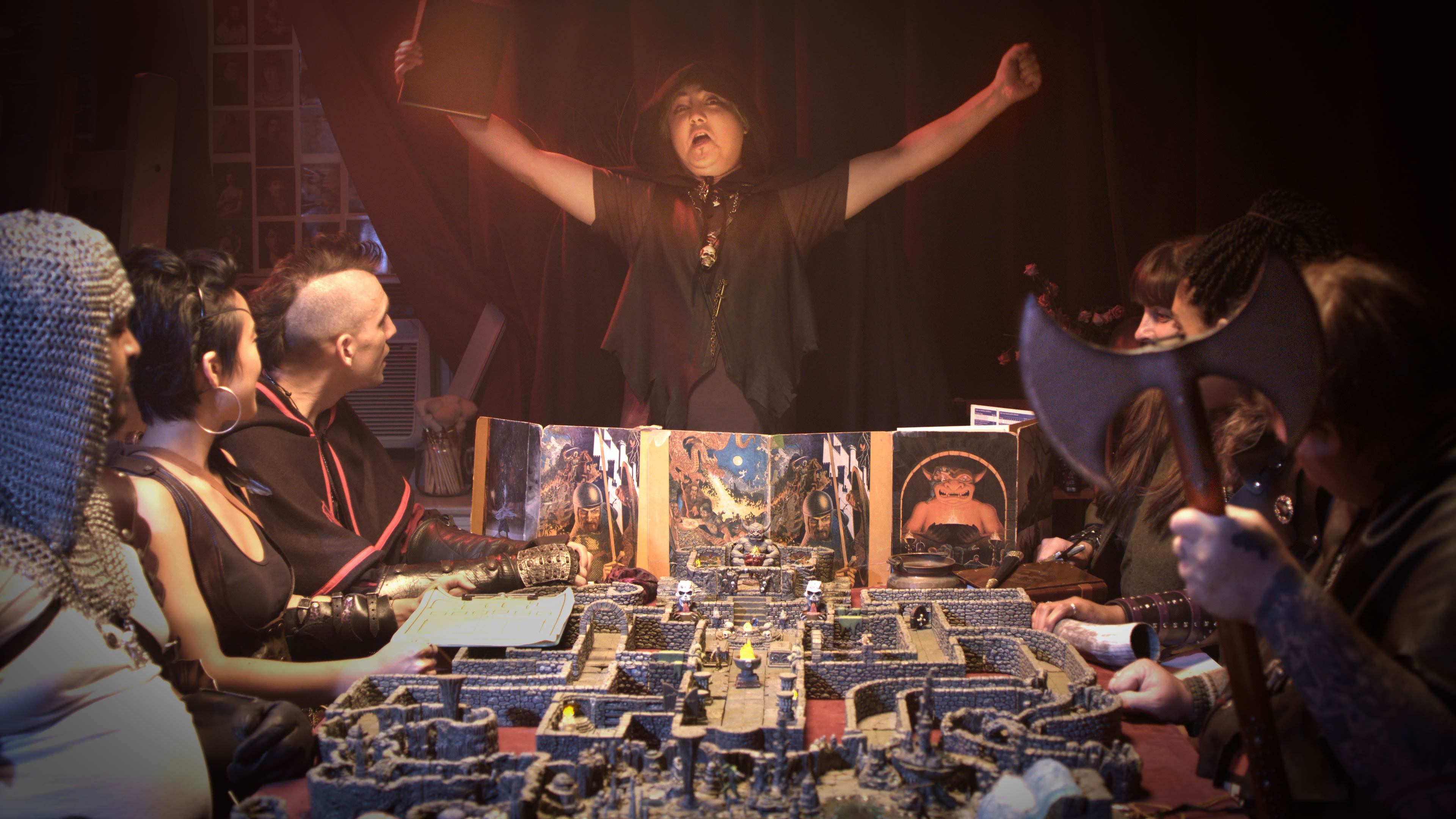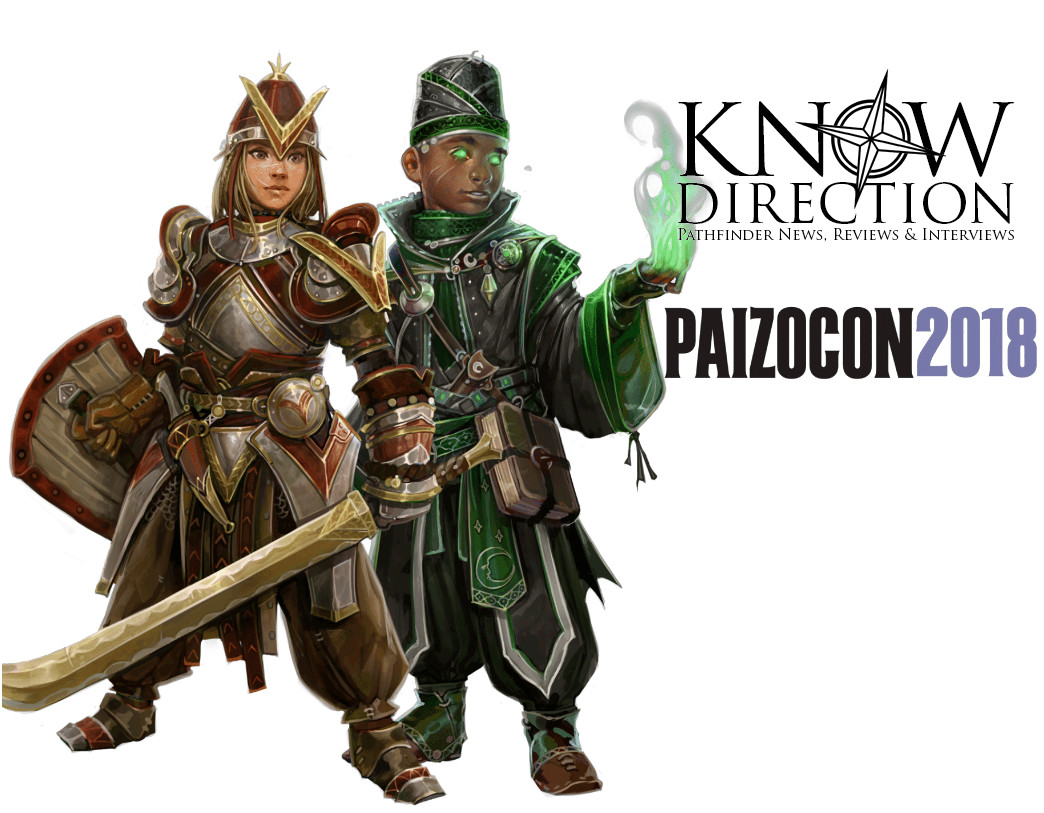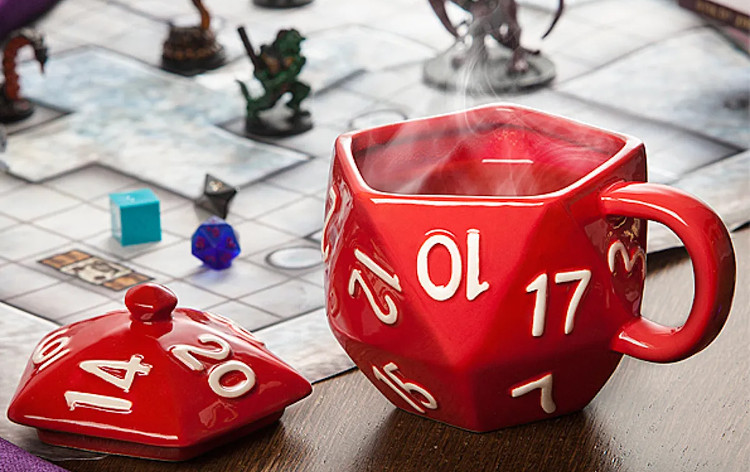What separates a roleplaying game from an improv game is how the line between in-character and out of character is handled. In Pathfinder, sometimes you are speaking as a player in a game, declaring actions and asking to understand what they’re experiencing. Sometimes you’re speaking as a character in the world. Sometimes you say something like “I say ‘Drop your weapon’ and I point my sword at him to Intimidate him,” doing both back and forth in one sentence. Improv may skirt the fourth wall more than most public performances, but it’s still rare (and an indication of either low quality or genius subversion of the genre) to hear the performers use technical terms while performing them.
PLAYER 1: A toast?
PLAYER 2: I’ll yes and to that and raise you a hug!
It is not until someone says “and scene” that the audience is now looking at performers and not performances, and it’s the introduction of a technical term that initiates the switch. Whereas in a roleplaying game, everyone at the table weaves between technical terms and speaking in-character. I am a homer for players speaking in-character but there are just some things that aren’t worth the linguistic acrobatics needed to avoid using technical terms.
PLAYER: I tighten my grip and lean into this attack, throwing caution to the wind in the name of felling this foe!
GM: You’re using Power Attack?
PLAYER: I am hoping what I lose in grace is made up for with the force of my blow, I wildly thrust my blade at my enemy.
GM: Kay. Power Attack.
Hm. Now that I’ve written it out, I kind of prefer the Player’s version of the description. Well, too late to change it! I can say that as long as the GM clearly understands the intent of the player’s flowery language, players should feel free to hand their GMs bouquets every turn.
Juggling acting and meta-terminology is an underappreciated aspect of an RPG, in a lot of ways the contributing factor to the fun atmosphere of this game we all know and love. It’s like when bilingual friends switch back and forth between the two languages they know in the name of expressing themselves in the most accurate and flavourful way they can.
As with most things, it’s important that these opposed forms of expression are balanced. Too much rules talk and Pathfinder’s less of a roleplaying game and more of a magical tactical simulator. Too much in-character talk and you’re just playing pretend. The rules are the command prompts that inform how the roleplaying scenes play out.
As GMs, we usually have more to balance than anyone else at the table. In this case, I argue that we have the advantage of being able to lean more into the in-character or in-world descriptions and that the game benefits from it. We are the computer into which our players input command prompt. Consider these two descriptions of the same situation:
EXAMPLE 1: Your attack deals 15 damage, or it would have if the skeleton didn’t have damage reduction!
EXAMPLE 2: Your blade scrapes the top and bottom of neighbouring ribs but you feel like a lot of the thrust of your blow is lost in the space between them.
Both convey the necessary information, but one does so evocatively. And unlike the earlier Power Attack example, we don’t have to be as clear about the statistical effects of what we’re describing because we are ultimately the only ones that need to know the particulars. Our job is to create the world that the players are interacting with, but also to convey a story in a way that gets the players to move the plot. If you find your players at a loss for where to take the plot, throw the world at them.
There are a couple of examples in the Hell’s Rebels campaign I recently played in of times when it was clear we weren’t following the path our GM (and the campaign) intended (and I alluded to in a previous column). The issue wasn’t that we didn’t know what he wanted us to do, it was that we didn’t know why our characters would do it. Minor spoilers for the Hell’s Rebels adventure path.
The first was about changing our base of operations. We’d been operating out of, effectively, a friend’s basement up till then. When we cleared out a dungeon, the GM asked if we were moving our operation there. We said no. Our friend’s basement had become home, and it had also proven to be a reliable spot in which to operate. There were theoretical advantages to the new base but we weighed those -in-character- against the advantages of staying and chose to stay.
The second was when we were given five suggested side quests that would advance our rebellion. We agreed with four of the suggestions but felt -in-character- that the fifth option was not one we were capable of completing (basically we had to blow something up, and none of us were strong casters or chemists) and that the consequences of failing to even attempt it were manageable (increased guards in the city, which was within reach of our sharp weapons and sharper tongues).
In both cases, our GM brought the options we had passed on back up multiple times, but always out of character. “You could move to this larger, empty dungeon if you want.” “The only thing left to do if blow up that place.” Had these been handled in-character, we might have reacted differently. Had the friend whose basement we were staying expressed concern for their safety, we might have considered moving. Had the reinforcements started to trickle in and it was clear that we couldn’t handle them like we presumed, we might have reconsidered how we might blow up the place with our resources. Or we might not have reconsidered, that’s kind of the point of agency.
As GMs, we can’t command prompt the players. That’s railroading. However, the prompts the players give us don’t necessarily end when the command has been executed. Like turning on a faucet, the command might continue until the players prompt the faucet off or else they have to deal with the flood. It’s important to remember that it’s your job to let the players know when their ankles are wet and not just that they have the choice to turn the water off.
And scene!





